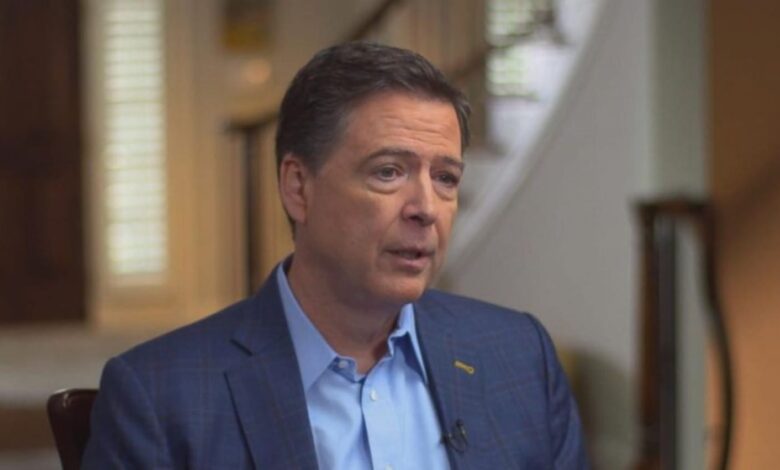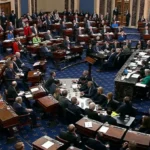James Comey Seeks to Toss Criminal Case Due to Trump-Appointed Prosecutor

Former FBI Director James Comey is challenging the legality of President Donald Trump’s appointment of Lindsey Halligan as acting U.S. attorney for the Eastern District of Virginia, arguing that her installation was ‘unlawful’ and that any actions taken under her authority — including his indictment — should be dismissed.
In a notice filed Tuesday, Comey’s attorneys informed the U.S. District Court in Alexandria that they intend to file a motion next week to dismiss the case on the grounds that Halligan’s appointment violated federal law and established precedent.
The notice cites two recent cases in Nevada and New Jersey in which Trump’s U.S. attorney appointees were disqualified under similar challenges.
“The Court advised at arraignment that such motion will require designation of and assignment to an out-of-district judge to hear and resolve that motion,” the filing states, referencing a prior order issued on Oct. 8. The defense submitted the notice “in the interest of efficiency and to avoid any unnecessary delay,” signaling that the formal motion is forthcoming.
Comey’s legal team has already indicated it plans to pursue a separate motion to dismiss the case on grounds of vindictive prosecution, arguing that the charges were brought as political retaliation against the former FBI director, who was fired by Trump in 2017.
Halligan, a former White House aide and personal lawyer to Trump, was appointed last month to lead the U.S. Attorney’s Office for the Eastern District of Virginia after the resignation of interim U.S. Attorney Erik Siebert.
Siebert had been overseeing ongoing federal cases against both Comey and New York Attorney General Letitia James before stepping down.
Comey’s forthcoming motion is expected to argue that the appointment violates constitutional and statutory requirements for U.S. attorneys, which typically mandate Senate confirmation.
His legal team cited recent federal court decisions in United States v. Garcia in Nevada and United States v. Giraud in New Jersey, where judges found that Trump’s direct appointments of acting U.S. attorneys without Senate approval exceeded executive authority.
JUST IN: Comey confirms he will challenge the legality of Trump’s appoint of Lindsey Halligan as US attorney.
— Kyle Cheney (@kyledcheney) October 14, 2025
He cites the cases of Trump’s disqualified US attorney picks in NV and NJ. https://t.co/oUdvbf5xIp pic.twitter.com/cLOPwpSWQH
Tuesday’s notice was not the only development in Comey’s case this week. Hours earlier, U.S. District Judge Michael Nachmanoff rejected a request from the Justice Department to limit Comey’s access to evidence designated as “protected material.”
The government had argued that sensitive information gathered during the investigation should be restricted from Comey’s personal review due to its classified or confidential nature. Nachmanoff disagreed, ruling that the proposed order was overly broad and could impede Comey’s ability to mount a defense.
“Protective orders addressing the confidentiality and privacy interests of others should not override a defendant’s right to a fair trial,” Nachmanoff wrote. “The government’s proposed order does not sufficiently define the information constituting ‘protected material,’ thereby making it overbroad.”
Comey, who served as FBI director from 2013 until his dismissal by Trump, was indicted last month on two felony counts — one for allegedly making a false statement to Congress during a 2020 Senate hearing and another for obstruction of justice related to the same matter. He has pleaded not guilty to both charges.
The former FBI director’s legal team argued that the Justice Department’s motion reflected a broader effort by Halligan’s office to “hamstring the defense” while defending what they describe as a politically motivated prosecution.
In their earlier filings, Comey’s lawyers emphasized his long government service and his familiarity with handling sensitive material.
“Mr. Comey is a licensed attorney admitted to practice in the Eastern District of Virginia and has been entrusted with some of the most highly classified information in the United States,” they wrote. “To assert now that he cannot be trusted with discovery in his own case controverts his record of distinguished public service.”
Comey’s notice sets the stage for a significant procedural challenge that could determine the future of the case. If the court rules Halligan’s appointment invalid, prosecutors from another district or the Justice Department itself may need to reassess the charges.
A hearing date for Comey’s forthcoming motion has not yet been set.





